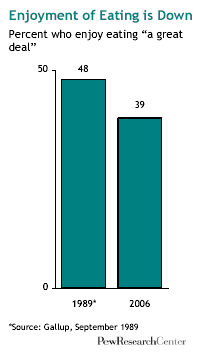
Americans are eating more but enjoying it less. Just 39% of adults in the latest Pew Research Center survey say they enjoy eating “a great deal,” down from the 48% who said the same in a Gallup survey in 1989.
The decline in enjoyment of eating has been greater among those who consider themselves “overweight” than among those who consider themselves “just about the right weight.”
The Pew survey also finds that about six-in-ten Americans say they eat more than they should, either often (17%) or sometimes (42%). More particularly, a majority of Americans report that they eat more junk food than they should, either often (19%) or sometimes (36%). The biggest reason, people say, is convenience.
It’s not possible to determine from this survey how much of people’s perception that they eat too much is the result of changes in their own food consumption patterns and how much is the result of changing attitudes and social norms about health and weight.
But one thing is indisputable: Americans have been gaining weight for quite some time. The most recent National Center for Health Statistics report found that 32% of all adults in this country are obese according to the government’s Body Mass Index (BMI) classification system. By contrast, just 23% of adults were classified as obese in government surveys taken from 1988 through 1994. Government surveys also find that the increase in weight is in part related to an increase in calorie and dietary intake. In short, people are eating more.
The Pew telephone survey, which was conducted from February 8 through March 7 among a randomly-selected representative national sample of 2,250 adults, finds the public is troubled by the nation’s expanding waistline; more than eight-in ten people (85%) say Americans are more overweight now than they were five years ago, and two-thirds of the public calls this a “major problem.”
Fewer People Enjoy Eating; Just as Many Enjoy Cooking
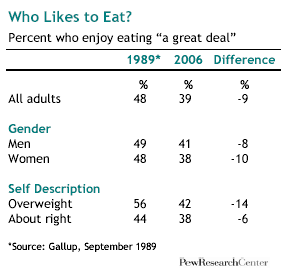
Since 1989, enjoyment of eating has fallen among all Americans, but it has fallen most sharply among those who describe themselves as overweight.
Among overweight adults, just 42% now say they enjoy eating a great deal, down from 56% who said this in 1989. There has also been a drop-off in enjoyment of eating among people who consider their weight about right, but this decline had been smaller – down to 38% today, from 44% in 1989.
While the drop-off has been greatest among the overweight, it remains the case now, as it was back in 1989, that the overweight are more prone than those not overweight to enjoy eating a great deal. But the margin between the two groups on this question is smaller now (4 percentage points) than it was then (12 percentage points).
Men and women say they enjoy eating about equally, as do whites and blacks. Hispanics are less likely than either non-Hispanic whites or blacks to say they enjoy eating a great deal.

Not surprisingly, enjoyment of eating goes hand-in-hand with an enjoyment of cooking. Enjoyment of eating also correlates with dining out frequently; with exercising regularly; with more education; with having an annual family income in excess of $100,000; and with being a younger rather than an older adult.
While enjoyment of eating has dropped since 1989, enjoyment of cooking has held steady. About a third of the public (34%) say they enjoy cooking “a great deal” and another quarter (26%) say they enjoy cooking “a fair amount.”
These figures are essentially unchanged since 1989, but there has been a notable shift in their gender composition. Today about the same percentage of women (35%) and men (32%) say they enjoy cooking a great deal; in 1989, women (39%) were more likely than men (25%) to say this. Also, more blacks (40%) than whites (33%) enjoy cooking a great deal.
People who enjoy cooking a great deal are less likely to eat out regularly than are those who don’t enjoy cooking as much. But about 13% of Americans say all of the following: they eat at restaurants at least weekly; they enjoy cooking “a great deal”; and they enjoy eating “a great deal.” More men than women and more younger adults (ages 18-49) than older adults (ages 50 and older) are in this gourmand grouping.
Who Thinks They Eat Too Much?

Not surprisingly, people who are overweight are more prone than people who aren’t to say they often eat too much. But so, too, are people who are on a diet; people who frequently worry about their weight; and people who dine out in a restaurant and/or eat fast food at least two times a week. Also, slightly more women (61%) than men (56%) say they often or sometimes eat more than they should.
Asked specifically about whether they eat more “junk food” than they should, a majority of respondents said that they did, either often (19%) or sometimes (36%). Here again, the groups most prone to say this include those who are overweight, those who worry about their weight, and those who are on a diet. And here again, more women (58%) than men (51%) say they eat too much junk food.
The survey also finds that there is a correlation between stress and eating. Of those who report that they frequently feel stressed, 21% report that they often overeat and 25% report that they often eat too much junk food. By contrast, among those who rarely or never feel stressed, 15% say they often overeat and 15% say they often eat too much junk food.
Why Do People Eat Junk Food? Convenience.
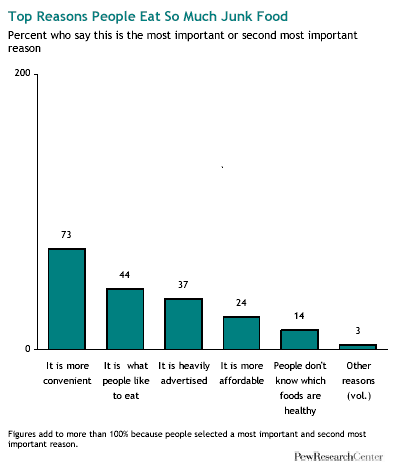
Asked to pick the top two from a list of five possible reasons that people eat so much junk food, respondents most often cited convenience (73%). Other reasons were that it’s what people like to eat (44%); it’s because of heavy advertising (37%); it’s more affordable (24%); and it’s because people don’t know which foods are healthy (14%).
There is some variation in this pattern of responses depending on whether the respondent is or isn’t a heavy consumer of junk food. Both groups agree that convenience is the biggest reason for America’s junk food habit. But among those who say they rarely or never overeat junk food, there is a greater tendency to stress the importance of advertising as a factor in the consumption of junk food by others. Among those who acknowledge that they themselves eat too much junk food, there is more of a tendency to stress the fact that it’s what people like to eat.
Who Eats Where, and How Often
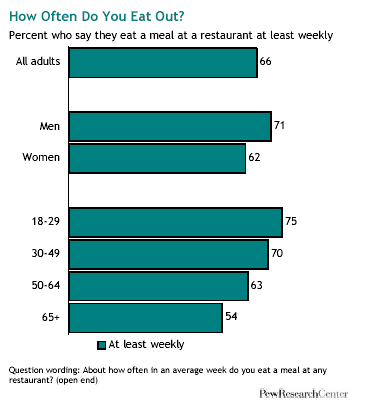
About a third of the public say they eat in a restaurant less than weekly; another third say they eat out about once a week, and another third say they eat out twice a week or more.
When respondents were asked whether they eat a meal from fast food restaurants such as McDonald’s or Burger King, one third of the public say they never eat such food; a quarter say they do so less than once a week, 22% say they do so about once a week and the remaining 19% say they do so twice a week or more.
Men eat at restaurants and eat fast food more frequently than do women. Younger adults (ages 18-49) tend to eat at restaurants and eat fast food more often than do older adults (ages 50 and older).
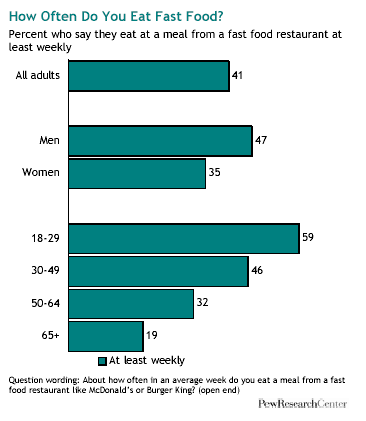
The generational differences are especially strong when it comes to eating fast food. About six-in-ten (59%) adults under age 30 eat a meal every week from a fast food restaurant, compared with about two-in-ten (19%) of those ages 65 and older who do so.
About the Survey
Results for this survey are based on telephone interviews conducted with a nationally representative sample of adults, ages 18 years and older, living in continental U.S. telephone households.
- Interviews conducted February 8- March 7, 2006
- 2,250 interviews
- Margin of sampling error is plus or minus 2.5 percentage points for results based on the total sample at the 95% confidence level. The margin of sampling error is higher for results based on subgroups of respondents.
Survey interviews conducted under the direction of Princeton Survey Research Associates International. Interviews were conducted in English and Spanish.
In addition to sampling error, bear in mind that question wording and practical difficulties in conducting surveys can introduce error or bias in the findings of opinion polls.
Read the full report for more details.




